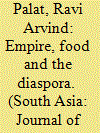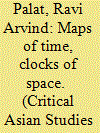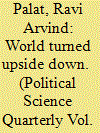| Srl | Item |
| 1 |
ID:
139462


|
|
|
|
|
| Summary/Abstract |
Despite being called ‘Indian restaurants’, the family-run curry houses that are characteristic of high streets in Britain are primarily run by Bangladeshi and Pakistani migrants. This article links the evolution of these restaurants in Britain to colonial history, migration after Independence and contemporary political changes. It analyses the popularity of curry houses alongside the continuing racism meted out to the wait staff and patrons by white Britons in the context of colonial history, migration patterns and the changing industrial fortunes of India and Britain in the post-World War II era. The emergence of wealthy and highly-credentialed Indians and British-born Asians has led to the rise of upmarket eateries and to a sharp bifurcation in diasporic communities.
|
|
|
|
|
|
|
|
|
|
|
|
|
|
|
|
| 2 |
ID:
123366


|
|
|
|
|
| Publication |
2013.
|
| Summary/Abstract |
The three articles that follow in this CAS feature collection - those by Candela, Harrar, and Fisher Onar - were first written for a workshop entitled "Shifting Geopolitical Ecologies and New Spatial Imaginaries," during the third Inter-Asian Connections conference in Hong Kong, in June 2012. The aim of the workshop was to identify and bring into discussion emerging mental, cultural, and political conceptions of spatial categories in Asia. Workshop organizers Caglar Keyder and Ravi Arvind Palat introduce the articles below and Palat provides background and context for the articles in his own article, "Maps of Time, Clocks of Space: Changing Imaginaries of Asia" (397-410).
|
|
|
|
|
|
|
|
|
|
|
|
|
|
|
|
| 3 |
ID:
123367


|
|
|
|
|
| Publication |
2013.
|
| Summary/Abstract |
When Asia was conceptualized as Europe's "other," it was also cast as a temporally delimited concept: once capitalist modernity - assumed to operate evenly across the globe by conservatives, liberals, and the left - spread to eastern Eurasia, the differences between two unequal halves of the continent were expected to evaporate. The persistence of differences long after "Asia" was incorporated into the capitalist world-economy has led to a cartographic definition of the continent. Such definitions do not allow for historical processes that reshape relations between peoples, forging new links and severing old ones. This article traces the changing imaginaries of Asia historically. Since there are no indigenous conceptions of the continent, the author argues that the changing imaginaries of Asia are linked to wider geopolitical processes. When eastern Eurasia was subordinated to the drives of the capitalist world-economy, existing linkages were severed and territories were linked to, or through, colonial metropoles. After a brief period of autarkic development after decolonization, states along the Pacific coasts were increasingly integrated through production and procurement networks leading to a new imaginary of Asia. Since the end of the cold war and the emergence of independent states with large hydrocarbon resources in Central Asia, countries that were once excluded from cold war imaginaries of Asia - as well as India - are being integrated through newer imaginaries that reflect the greater prominence of China and India today as well as the rise of Islamic militancy and new ethnic conflicts.
|
|
|
|
|
|
|
|
|
|
|
|
|
|
|
|
| 4 |
ID:
061090


|
|
|
| 5 |
ID:
096658


|
|
|
|
|
| Publication |
2010.
|
| Summary/Abstract |
By focusing on the consequences of the dismantling of regulations over the financial sector, the current debate on the causes of the global economic meltdown obscures the cyclical occurrence of speculation in capitalism, as the accumulation of more capital than can be profitably invested in the production and sale of commodities results in financial expansion. Historically financial expansion has signalled the end of one world-scale system of accumulation and the transition to a new system as capital flows from declining powers to rising powers. However, the contemporary period is distinguished by capital flows from rising powers to declining ones. An analysis of the current crisis suggests a reversal of this anomaly as it reduces the ability of China and other East Asian states to support the US dollar. At the same time 'emerging market economies' have begun to forge new relationships that could provide the framework for a new system of partnership between states and enterprises to reconstruct a new cycle of accumulation if two hurdles are overcome: 1) absorption of labour that is being displaced because of the high organic composition of capital and 2) dampening of the growing inequalities in income which has not only restricted the growth of markets but is also fuelling increasing social conflict.
|
|
|
|
|
|
|
|
|
|
|
|
|
|
|
|